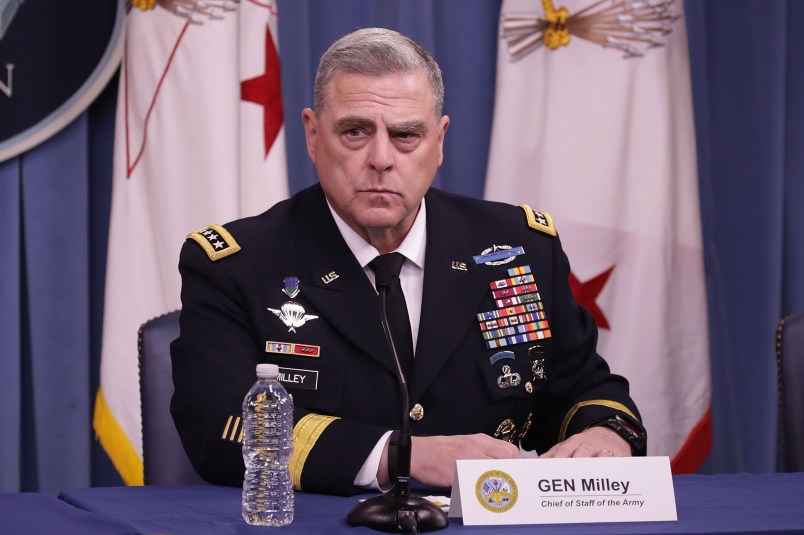In the days after the Jan. 6 Capitol insurrection, Joint Chief of Staff Chairman Gen. Mark Milley reportedly became “involved” in the country’s nuclear chain of command, and also assured his Chinese military counterpart that an attack from the U.S. was not forthcoming.
That’s all according to write-ups of the book “Peril” by Washington Post reporters Bob Woodward and Robert Costa. But the report raises key questions, given that Milley, as chairman of the Joint Chiefs of Staff, is not a part of the military’s chain of command.
Were these his actions to take? And what damage might his decisions have done to civilian control of the military?
These questions have already sparked quick reaction in Washington, with Sen. Marco Rubio (R-FL) demanding in a letter to the White House that President Biden fire Milley.
Army Lt. Col. Alexander Vindman, no stranger to civilian-military relations, tweeted that Milley “must resign” for having “usurped civilian authority, broke Chain of Command, and violated the sacrosanct principle of civilian control over the military.”
If this is true GEN Milley must resign. He usurped civilian authority, broke Chain of Command, and violated the sacrosanct principle of civilian control over the military. It’s an extremely dangerous precedent. You can’t simply walk away from that. #dotherightthingintherightway https://t.co/izsMMCFPrz
— Alexander S. Vindman (@AVindman) September 14, 2021
Milley has yet to address the reporting, as of this writing. But experts in civil-military relations that TPM spoke with described his actions, as reported, as taking a chunk out of civilian control of the military, while also posing a fundamental problem to the military’s chain of command.
Lindsay Cohn, an associate professor at the Naval War College, told TPM that Milley’s actions marked a step away from civilian control of the military.
Milley is reported to have ordered a group of commanders on Jan. 8 to involve him if Trump issued a nuclear launch order.
Separately, Milley held phone calls with his Chinese counterpart, which he kept secret from Trump, telling the PLA commander that the U.S. did not intend to strike China.
At the time, the U.S. government was reeling from the Jan. 6 insurrection.
It remains unclear whether Milley was acting on specific information when he convened the meeting to discuss the nuclear chain of command, if he was acting out of a generalized sense of concern, or if he was doing so in response to a phone call he had had with Speaker of the House Rep. Nancy Pelosi (D-CA) on Jan. 7, during which he reportedly agreed that Trump was crazy and needed to be blocked from the nuclear arsenal.
On the nuclear question, it remains unclear what Milley meant when he reportedly said that he would be “involved” in any decisions about issuing a launch order.
“It certainly is him inserting himself into a process where he does not have an official or statutory role,” Cohn said.
It appears to be further than any previous Joint Chief of Staff chair has gone in the direction of eroding civilian control.
Michael Desch, a professor of international relations at Notre Dame who focuses on national security policy, recalled criticism that Colin Powell received in the 1990s for objecting to President Clinton’s proposal to lift a ban on gays in the military.
That’s a far cry from the reporting around Milley’s actions, which Desch said appeared to be “problematic.”
“If it’s the case that he says the order would have to go through him, he’s mistaken,” Desch said.
Cohn said that the conversations between Milley and his Chinese counterpart also suggested that the Joint Chiefs leader may have crossed a line, in part because Milley reportedly committed the U.S. to a policy course without being so ordered by the President.
“What is concerning is that Milley appeared to be informing his counterpart that he would prevent the president from doing anything threatening,” she said. “Number one, that’s not his role. And it’s kind of questionable whether he could have carried it out.”
Loren DeJonge Schulman, a senior fellow at CNAS and a former adviser to National Security Advisor Susan Rice, contended that the problem had less to do with questions about the chain of command and more to do with the dire politics of January 2021.
“I am not excessively bothered by this as a moment in time if Milley was also actively engaging the president, the Cabinet, the Congress, and others on what he saw as his military advice and concerns about an emerging security situation,” she wrote in an email to TPM. “But the problem Milley sought to solve here isn’t really a civ-mil process question. It’s a political challenge (do we trust who is president–who the political electoral system chose).”



